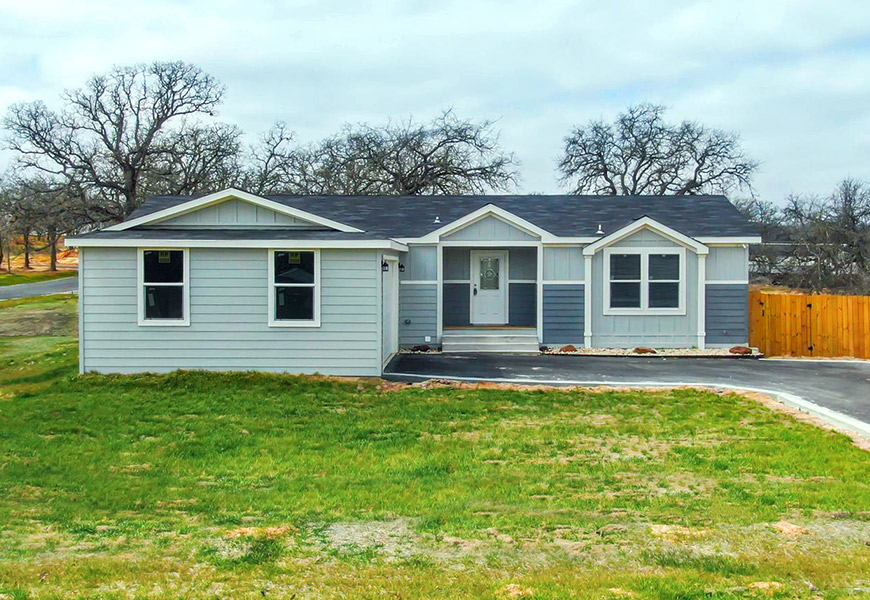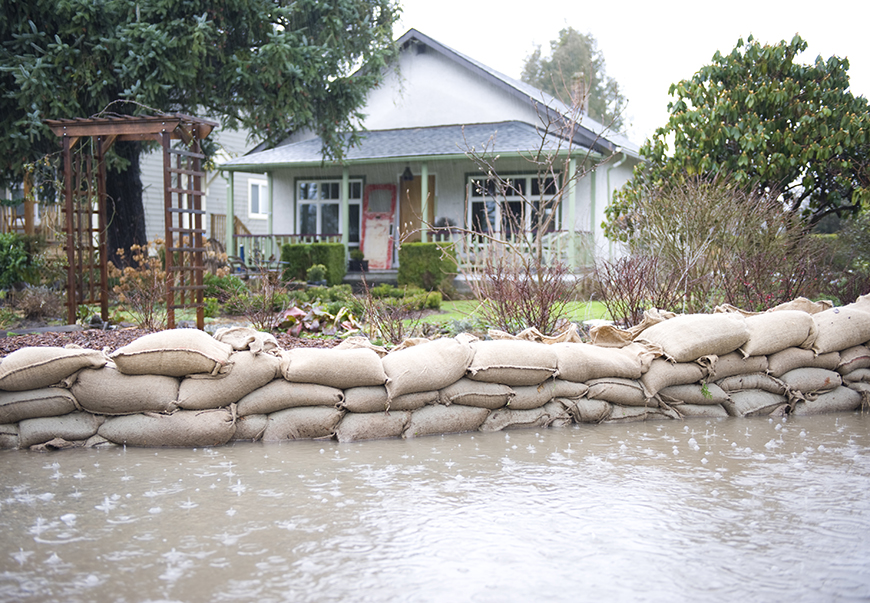
It’s Real

Developers have broken ground on the first residential subdivision in Texas consisting entirely of an upgraded class of HUD-code manufactured homes. These "CrossMod" homes qualify for conventional Fannie Mae and Freddie Mac financing. |
The first residential subdivision in Texas exclusively offering “CrossMod" manufactured homes is currently under development about four miles outside Seguin. CrossMod is the Manufactured Housing Institute’s trademarked name for an upgraded class of national HUD-code manufactured homes (MH). It should not be confused with “modular" homes built to meet a specific local building code.
“The goal for this development is to provide someone with a nice home that they are proud to own in a lower price range than starter homes in a traditional densely developed subdivision," said Dustin Arp, president of New Braunfels-based Spark Homes LLC, the subdivision’s developer.
CrossMods, which are only sold with land as real property, are eligible for financing under the same conventional loan terms as site-built, single-family homes through Fannie Mae and Freddie Mac. The two government-sponsored enterprises (GSEs) teamed up with the manufactured housing industry to develop and finance factory-built housing of similar quality to site-built starter homes but at a more affordable price point. While Fannie Mae has named its mortgage program MH Advantage, Freddie Mac has chosen the name CHOICEHome.
“The GSE loan programs offer a rare opportunity for the MH industry to grow from representing only 9 percent of all new home sales annually," said Dave Busche, director of business development central region at Skyline Champion Homes. “MH finally has the chance to enter into mainstream homebuilding and really participate in the affordable housing solution."
“You also need a mix of FHA (Federal Housing Administration) and VA (Veterans Affairs) loan products along with the conventional loans being financed by Fannie and Freddie," said Arp. “You can’t just offer conventional financing in a development like this. A CrossMod that qualifies under the MH Advantage or CHOICEHome programs can qualify for an FHA or VA loan. It is just less likely to make value on an appraisal, and the interest rate would be higher when compared with site-built homes. But the real difference is about $2,000 to $3,000 in added closing costs from cost surcharges such as points."
Arp’s least expensive floor plan starts at $185,000 with no options or upgrades. The majority of homes in the development will be priced between $200,000 and $230,000. Lot size is one acre while home sizes range from 1,113 to 1,789 square feet.
“Developers choosing a subdivision model similar to production homebuilding on a typical 1/8-acre lot could probably reduce these prices by about $15,000 to $18,000," Arp said.
Development Challenges
Demand for factory-built housing in Texas is currently quite strong.
“MH manufacturers are experiencing exceptional backlogs," said Busche. “If the backlogs continue, the only way to achieve real growth in CrossMod projects is to expand production through new manufacturing plants. But construction of new facilities will be no small task."
“A big challenge to widespread adoption of CrossMods is going to be sufficient inventory," Arp said. “If the houses aren’t out there on the ground, consumer acceptance is going to be slow."
“Two other delay influencers besides backlogs are development timeframes as well as restrictive zoning—’not in my backyard’ issues," said Busche. “We have four business development managers at Skyline Champion. Each of us is engaged with multiple CrossMod prospects/projects, some for well over a year. Most new projects are just not ready to accept delivery of homes yet."
Although Texas does not have county zoning ordinances, allowable zoning for all MH, including CrossMods, inside metropolitan areas remains a challenge.
“Acceptance by municipalities is a key topic in every convention I’ve been to," said Arp. “Most cities start with a base of codes provided to them by consultants that they can adopt and make small changes to. If we could create a new zoning category for CrossMod that cities would accept, that would be a major breakthrough." To that end, Arp makes it a point to drive as many local city and county officials through the subdivision as possible.
Busche states that only four large MH manufacturers in Texas are currently offering CrossMod homes. Skyline Champion’s Athens, Texas, factory, which is providing the CrossMods for Arp’s development, is one of them. Each of Skyline Champion’s four Texas facilities produces a different mix of factory-built homes, with the Athens factory building modular-coded product as well.
Arp also believes real estate agents have to be made more aware of the existence of CrossMods.
“Most agents don’t know that potential homeowners can obtain an attractive home and lot size by purchasing a CrossMod. Unfortunately, it’s hard for them to get involved until the homes are actually out there and available to show," he said. “If there were sufficient CrossMod developers, I believe we could provide manufacturers with loads of CrossMod sales."
Appraisals present another challenge. In December 2020, FHA issued a mortgagee letter recognizing a difference between CrossMod and traditional MH for appraisal purposes. As a result, FHA appraisers may include site-built comparables if fewer than two comparable MH Advantage or CHOICEHome sales are available. This appraisal allowance was already acceptable for conventional GSE financing.
“But just because that mortgagee letter is out there doesn’t mean that an appraiser is aware of it," Arp said.
Based on his banking experience, Arp uses accepted appraisal adjustments to piece together a comparative market analysis for appraisers. He spends considerable time making sure comparable sales support the required sales price he is targeting.
“If they don’t have the knowledge of how to appraise a CrossMod, then no one can buy these products," he said.
Developer Skills Affect Affordability
Arp thinks developers who have a more diverse background and skillset will be much more adept at producing the most affordable CrossMod product.
“It’s difficult for any MH developer to be diversified," he said. “All MH purchases require a retailer’s license, but a retailer generally can’t do the land development. A licensed installer, or a subcontractor working under one, is then responsible for installing the foundation, septic system, and so forth.
“I also believe that if the developer pursues a production homebuilder sales model, with a model home and inventory to show, the product will explain itself. The lower collateral risk that allows Fannie and Freddie to remove cost surcharges such as points stems from the increased marketability of CrossMods. That increased marketability results in higher product acceptance from consumers. I don’t think the industry will ever be successful trying to pursue a scattered-site development model where the home is shown at a MH dealership and sold to be put on a homeowner’s vacant lot. It needs to be shown in the environment in which it will be placed as a finished product."
Counties also have subdivision regulations that developers must be familiar with.
“An example is sewer treatment," Arp said. “Unless you want to build a treatment facility, which is a lengthy process with the Texas Commission on Environmental Quality, you will need to be familiar with the state requirement for septic tanks."
A civil engineer must also be involved in the project to address issues such as drainage and watersheds. Drainage requirements will come from the area’s floodplain administrator who will require an inundation study examining watersheds crossing the property. The civil engineer must come up with a plan to show impact on adjoining neighbors and homeowners.
Arp thinks there doesn’t have to be as much homebuyer education if the product is on the ground to view in person.
“The home will speak for itself," he said. “If you follow the guidelines, especially frontal elevation to make it look more like a site-built home, product adoption is immediate. The reality is a developer must find the right piece of land in the right configuration at the right price with the right utilities to the site."
In a 50-mile radius, he might find one piece of land that fits all those requirements.
“It could easily be a year to 18 months from the beginning of this process to selling the first house," Arp said.
Arp also drew up his own homeowners’ association rules as well as a 60-page builder’s contract.
“We are taking three separate components and, at the time of closing, putting them all together: a garage that is constructed on site, the CrossMod house, and the land," he said.
Arp notes there are separate disclosures and warranties to be considered.
“The garage technically has a separate warranty from the house," he said. “The CrossMod manufacturer will warranty the actual house. The foundation has a totally separate warranty as well."
Not for All Developers
Developing CrossMods won’t be for everyone. Arp summed it up well in a February 25, 2021, podcast for ManufacturedHomes.com.
“Developers are going to want to see my books," he said. “They have all done their own proformas, modeling, and market research. However, unless they identify some of the key efficiencies not currently being exploited by MH retailers pursuing a scattered-site model, CrossMod just won’t make sense.
“The key here is to build a product that is visually competitive with an entry level site-built house that remains as affordable as possible. When you exit the affordable segment, you lose that market share where MH could triple the size of the industry in the next six or seven years with enough market participants. You can’t be a horizontal developer/land man who wants to outsource everything and then participate in the affordable sector."
Arp believes developers will have to get creative to develop the right efficiencies.
“Some of the savings have to be passed on to the consumer," he said. “We will probably have to offer the buyer an 8 to 10 percent savings over the site-built homes being offered by production homebuilders to initially gain wide acceptance of CrossMods."
____________________
Dr. Hunt ([email protected]) is a research economist with the Texas Real Estate Research Center at Texas A&M University.
You might also like

Publications
Receive our economic and housing reports and newsletters for free.






